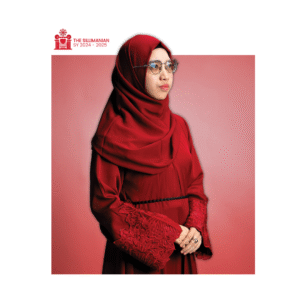

Words by: Hennah Narciso
Nurshema Upi embraces the dichotomy of her religious and gender identitiesWord
With a quiet yet powerful statement of identity, she marches across ballfields and university halls as her hijab flows boldly around her. Described as warm by family and friends, she brings authenticity wherever she goes. To her, empowerment is not about standing above but standing beside.
Nurshema Upi, with her Tausug roots and unwavering feminine resilience, stands as hope for the underrepresented. She breaks not only barriers built around gender stereotypes, but also the twisted narratives imposed upon her identity as a Moro.
Her faith, being the most influential force that shapes her journey, guides her through unfamiliarity—just as she did when she moved to Dumaguete and pursued her valuable dreams.
Born and raised in the vibrant maritime shores and culturally rich land of Jolo, Sulu, she came to the coastal city of gentle people and enrolled in the civil engineering program at Silliman University (SU). Unbeknown to her, this would be the start of the far-reaching impact she is about to make within campus.
This, however, did not come easily. To navigate a city miles from home, she had to face both joyful and difficult experiences that deepened her sense of purpose.
Her involvement in the SU Reserve Officers’ Training Corps (ROTC) is a testament to the rigorous training she has endured, building her an honorable reputation within the field. In the school year 2023–2024, she became corps commander, where she honed the finest bits of her leadership skills.
This pivotal role she undertook in the ROTC stands as living proof of her defiance against stereotypes, with her presence and contributions in the field morphing into a subtle yet firm challenge to these long-held perceptions.
The fruits of her hard work in all the roles she took on in ROTC earned her experiences, recognition, and rewards that hold more than just tangible value. Among these was her remarkable achievement of being named the 2022 Best Female ROTC Cadet of the Year. This proved yet another challenge she has overcome, shedding a light of hope to those who would come after her.
Though her affiliation with the ROTC was far from what she had envisioned for herself, she feels fulfilled by how the experience has unfolded. To have encountered enriching experiences and people who helped her grow—especially her buddies that turned family—she is grateful for the opportunities that have transformed her life in so many ways.
Her reputation in the ROTC is solid proof of the many barriers she broke for women and the Moro community, but her journey did not end there. Clearly, the roles she takes on in uniform are just components of the broader roles she has set for herself.
Working with various organizations, such as the Philippine Institute of Civil Engineers SU Chapter (PICE-SUSC), SU Peer Advocacy Facilitators, REDSHIELD Fraternity, and American Concrete Institute Philippines, Nurshema has actively given herself a name in the competent course of leadership.
Now in her final year of college, she prepares to bid farewell to the halls of SU while continuing to lead. Serving as the president of PICE-SUSC, she works tirelessly to foster a sense of collaboration among her peers, setting the stage for future leaders to follow in her footsteps.
Entering a community that fosters inclusivity, she was able to grow and discover herself more. This was a significant step forward in her life, breaking free from the sheltered sleeves that had been wrapped around her for so long. She met people, went places, and embraced experiences that helped her welcome new perspectives.
This, in turn, propelled her the idea of representation; to bring attention to women and the Moro community. Her commitment to supporting these marginalized groups reflects her dedication to a more accepting society.
But beyond leadership and recognition, one stands out in a more personal and profound way, the Islamic Association of Silliman. Being among those who share her roots is like a warm hug that can only be felt at home, offering her a much-needed pause from the continuous flow of life.
All these accounts say one thing about Nurshema: she stands as a testament that resilience knows no identities. She continues to show up in unwavering grace that proves women, Muslims, and all other underrepresented groups can coexist alongside others in the same way identity and values can stand together in the pursuit of excellence.
To be a Moro and a woman at the same time is to constantly navigate a world that often misjudges both identities. Yet, Nurshema rises beyond these barriers and continues to fight with courage and faith. Her story is one that mobilizes, showcasing hope that inspires others to embrace their identity and stand firm against adversity.
